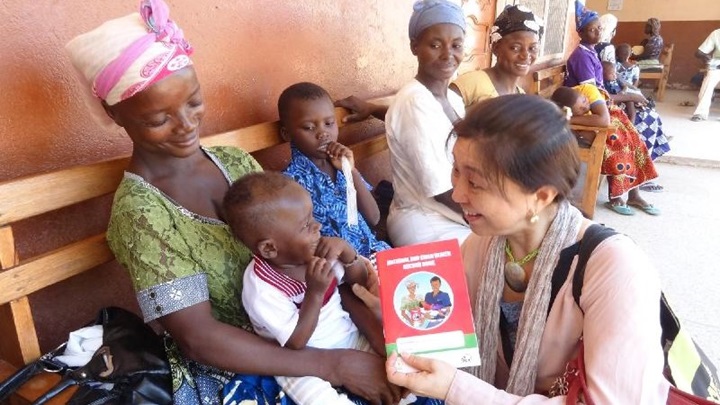TICAD9 Series (3): Research Highlights on Tackling Social Challenges in Africa
2025.08.12

As part of the Ninth Tokyo International Conference on African Development (TICAD9), to be held in Japan from Aug. 20 to 22, 2025, JICA will host a series of side events
on a variety of themes. JICA Ogata Research Institute will also hold a side event on migration and human security in Africa
. Be sure to join us!
In the lead-up to TICAD9, the JICA Ogata Research Institute is sharing a series of articles highlighting its research and initiatives on Africa:
A third installment focuses on the theme of “Society,” one of the three pillars of TICAD9, alongside “Economy” and “Peace and Stability,” under the overarching vision of “Co-create innovative solutions with Africa.”
Building a society where everyone can live in good health, grow, and feel secure requires action across a wide range of fields. Through efforts in health, water and sanitation, education, and the environment, JICA is committed to helping create a society in which people in Africa can lead better lives. Below are highlights of related research conducted by the JICA Ogata Research Institute.
In recent years, the number of premature deaths from Non-Communicable Diseases (NCDs) in low- and middle-income countries (LMICs) has dramatically increased. This study intends to demonstrate the socio-economic impact of NCDs in LMICs and to identify policy challenges for promoting NCDs control in LMICs through a systematic review of literature and a case study on Burkina Faso.
Over 60% of teenage pregnancies in Uganda are said to be unintended. This study will develop a new intervention to promote Sexual and Reproductive Health and Rights (SRHR) among teenagers through mobile money shops and verify its effectiveness.
EMBRACE (Ensure Mothers and Babies Regular Access to Care) aims to ensure seamless (regular access) and appropriate treatment and service to mothers and babies. This project aims to develop effective approaches to ensuring Continuum of Care (CoC) in order to embody the EMBRACE model.
Based on the findings of the EMBRACE, Ghana promoted CoC by developing an integrated Maternal and Child Health (MCH) Handbook. This study aims to verify the effects of the nationwide rollout of the MCH Handbook on maternal and child health indicators by utilizing secondary data sources such as the Demographic and Health Survey.
Drawing on his involvement in the project “Situation Analysis on SARS-CoV-2 Infection Using a Seroprevalence Survey in Democratic Republic of Congo ,” Isono Mitsuo, an advisor to JICA’s Human Development Department, discusses strategies, challenges, and the role of aid agencies in strengthening health research capacity of the countries in Sub-Saharan Africa.
This study aims to examine the effectiveness of interventions to improve hand hygiene, including facility installation and hygiene awareness programs, at primary schools in Madagascar and Tanzania that lack basic handwashing facilities due to insufficient funding.
Using and analyzing existing impact evaluation data—such as from a Groundwater Development project in Luapula Province, Zambia—this empirical research aims to study and report on the outcomes of JICA programs, as well as to make recommendations to local policy makers where appropriate.
This study investigates, from the viewpoint of collective management of common pool resources, the social dimensions of sustainable management of water users' associations and rural water supply systems.
This study reviews the impacts of JICA projects by applying econometric analysis to empirical data, identifying key factors in creating the impacts.
Senior Research Fellow Maruyama Takao shares three cases of impact evaluation conducted as part of the community-driven "School for All " initiative in Madagascar and the lessons for future use of evidence.
Using the nationally representative Demographic and Health Survey dataset, this study analyzes the effect of the Universal Primary Education policy on educational attainments of out of school children in Uganda.
The Participatory Forest Management Project in Belete-Gera, Ethiopia (2003–2013) aimed to conserve forests and improve the livelihoods of local communities. Research from the project and other forest-related studies are featured.
This study aims to clarify how the concept of "resilience" to climate change, which is used in the field of natural environment conservation, can be used to solve problems at the field level by investigating relationships between concepts, activities and results.
Following the destruction of social infrastructure and environmental management systems during Algeria’s civil war in the 1990s, this study analyzes the post-war efforts to build environmental administrative capacity through public awareness and reevaluates the capacity development approach.

事業事前評価表(地球規模課題対応国際科学技術協力(SATREPS)).国際協力機構 地球環境部 . 防災第一チーム. 1.案件名.国 名: フィリピン共和国.

事業事前評価表(地球規模課題対応国際科学技術協力(SATREPS)).国際協力機構 地球環境部 . 防災第一チーム. 1.案件名.国 名: フィリピン共和国.

事業事前評価表(地球規模課題対応国際科学技術協力(SATREPS)).国際協力機構 地球環境部 . 防災第一チーム. 1.案件名.国 名: フィリピン共和国.

事業事前評価表(地球規模課題対応国際科学技術協力(SATREPS)).国際協力機構 地球環境部 . 防災第一チーム. 1.案件名.国 名: フィリピン共和国.

事業事前評価表(地球規模課題対応国際科学技術協力(SATREPS)).国際協力機構 地球環境部 . 防災第一チーム. 1.案件名.国 名: フィリピン共和国.
scroll